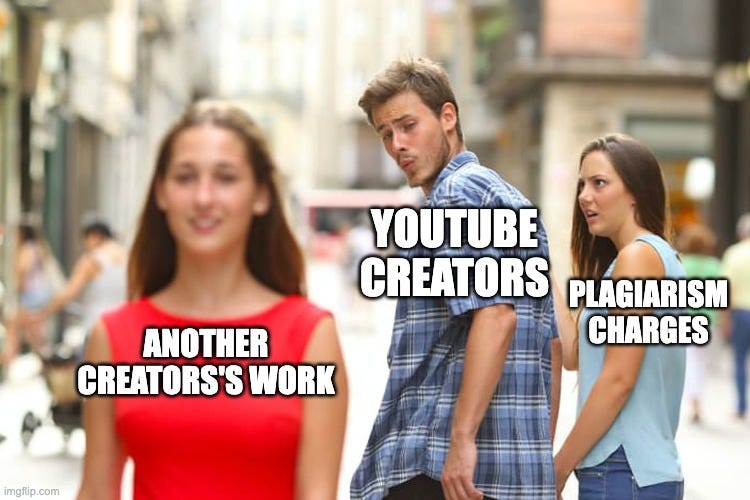My Meme Response: "Two Girls and One Guy" and Plagiarism within Content Creation
Inspired by "Plagiarism and (You)Tube" by Hbomberguy on YouTube and the Illuminaughti & Brian Deer Plagiarism YouTube Scandal
The meme format I chose to use for my meme response is this popular “Two Girls and one Guy” meme that has been present in our Digital Culture for years now. While I don’t know if anyone will ever know the official origin of this photo, the intent of my version of the meme was to display how some YouTube creators will see the work of other creators, and use it for their own content without getting permission and providing proper attribution to the original creator.
The class content I chose to use was the “Plagiarism and (You)Tube” video that was assigned for us to watch for homework last week. The contents of this video really resonated with me, as I have posted on YouTube before, and it has been a large part of my online life and learning for a long time. The video debriefs the situation between the YouTube creator Illuminaughti, and the journalist Brian Deer who published “MMR: What They Didn’t Tell You”. In the video, Hbomberguy speaks about how Illuminaughti took several parts of Deer’s video and spoke them word for word in her video, and didn’t once give credit to Brian Deer for his work. Illuminaughti was under fire after her followers discovered the dark truth behind her video, and defended her argument by saying she credited Deer in the description of her video. However, the link was hidden in a pool of other links. In this case, Brian Deer’s work would have been the attractive girl walking by, Illuminaughti would be the boyfriend, and her plagiarism infractions/ her viewers thoughts on her plagiarism would be the girlfriend.
Studying the Illuminaughti situation shines light on the importance of crediting the original author of any and all works creators, students, and authors use in their own personal writing, assignments, media, and publications. As we discussed in class, if you are a creator, you should never use anyone else’s work without giving them clear attribution and credit, as they were the person who put in the work, time, research, and passion into developing the idea or content that you are repurposing. If you publish a video on YouTube, an online article, or a Podcast on streaming services that you have plagiarized in, the original creator could take legal action. My meme displays the importance of not falling for the temptation to use another creator’s work just because it is easy and accessible, because you could suffer severe legal consequences in the form of Plagiarism charges.
Citations:
Hbomberguy, H. B. (2023). Plagiarism and you(tube). Retrieved from
In-class discussion topics also used.





I also used the popular meme to respond to convey a message, but I really enjoyed your views on plagiarism in the context of YouTube content creation. Your explanation of the meme's significance within the context of the "Plagiarism and (You)Tube" video adds depth to your post, involving Illuminaughti and Brian Deer to illustrate the importance of giving proper credit to original creators. People who plagiarize are taking the easiest way out rather than creating their own original content. It may be easier, but it is unoriginal and adds no value to their content.
While I can see why people just take information word for word to make content quicker, it cheapens the efforts of people who make content with purpose. Perhaps the plagiarists, such as Illuminaughti, do not value the effort of this content, but do value their own efforts in voice acting and editing.